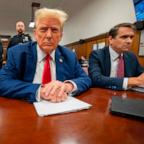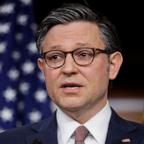President Donald Trump voices support for #WeWantToPlay movement
President Donald Trump joined the #WeWantToPlay movement on Monday by voicing his support for college football players, coaches and fans around the country who are trying to persuade university presidents and conference commissioners to salvage the upcoming season, which is in doubt because of concerns about playing during the coronavirus pandemic.
On Monday, Trump tweeted: "The student-athletes have been working too hard for their season to be cancelled. #WeWantToPlay."
Trump retweeted a post by Clemson quarterback Trevor Lawrence, who has been outspoken about his desire to play what would probably be his final collegiate season. In another tweet Monday, Trump said: "Play College Football!"
"The president would very much like to see college football safely resume their sport ... they work their whole lives for this moment and he'd like to see [these athletes] live out their dreams," White House press secretary Kayleigh McEnany said Monday.
On Sunday night, Lawrence was among more than a dozen college football players from each of the Power 5 conferences who came together to issue a joint statement, which expressed their desire to play the 2020 season and included items they feel need to be addressed to ensure a safe and fair environment moving forward.
Earlier Monday, U.S. Senator Ben Sasse (R-Nebraska) wrote a letter to Big Ten Conference presidents and chancellors urging them not to cancel the season. On Sunday, ESPN first reported that Big Ten presidents, following a meeting on Saturday, were ready to pull the plug on the fall sports season, and they wanted to gauge whether commissioners and university presidents and chancellors from the other Power 5 conferences -- the ACC, Big 12, Pac-12 and SEC -- will fall in line with them.
Sources told ESPN that a vast majority of Big Ten presidents have indicated that they would vote to postpone the football season, hopefully to the spring. The Big Ten presidents met again Sunday night but didn't vote and took no action, according to a league spokesman.
"Life is about tradeoffs," Sasse wrote. "There are no guarantees that college football will be completely safe -- that's absolutely true; it's always true. But the structure and discipline of football programs is very likely safer than what the lived experience of 18-to-22-year-olds will be if there isn't a season.
"Canceling the fall season would mean closing down socially-distanced, structured programs for these athletes. Young men will be pushed away from universities that are uniquely positioned to provide them with testing and health care."
U.S. Representative Anthony Gonzalez (R-Ohio) told ESPN on Monday night that he thinks the Big Ten would be making an "enormous mistake" if the conference decides not to play this fall. Gonzalez, who played wide receiver at Ohio State and later in the NFL, said he believes it could have a catastrophic negative impact on players.
"I put myself in their shoes and the reality is a significant percentage of these locker rooms are full of kids that come from the most difficult environments you could face in this country," he said. "The college football environment ... for so many of these kids is the greatest opportunity they've ever had, may ever have, and it's something they've looked forward to their entire lives."
Gonzalez said he thinks canceling the season might hurt the players' mental and physical health. He said that even if players remain on campus and in the structured environment of a college football program after a season is canceled, he doubts they'll receive the same medical care and have the same support structure they would have if the season is played.
Gonzalez said he finds it unfair that players, their parents and their coaches weren't given a voice in the decision-making process. Gonzalez added that he's shared his thoughts with decision-makers in the conference.
The first-term congressman has been working on creating a bill that would provide a framework for college athletes to profit from name, image and likeness deals in the future. Gonzalez said he fully supports the recent player-led movement for a voice in the process and more uniform safety protocols, but he doesn't believe Congress should intercede with legislation that completely overhauls the college sports world.
Gonzalez said he intends to keep his efforts focused on the ongoing debate about how college athletes might make money in the future.
"I think Congress can handle the NIL issue, [but] if we open it up to every issue that exists in college sports I don't think we'll make it better," he said. "I think we'd probably make it worse."
ESPN's Dan Murphy contributed to this report.




